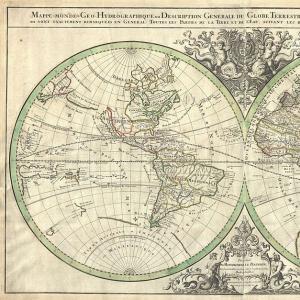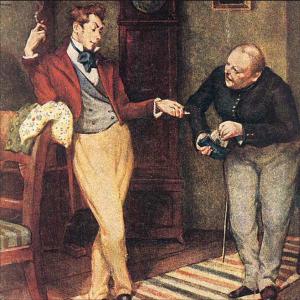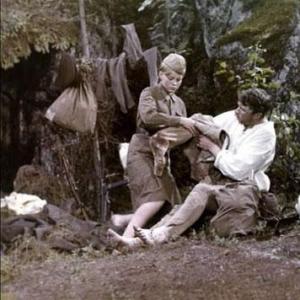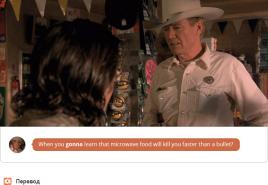Eugene Onegin description of the duel. Lensky's duel with Onegin (Analysis of an episode from the sixth chapter of A.S.
He sat down, flies to the mill.
Rushed. He tells the servant
Lepage trunks fatal
Carry after him, and the horses
Drive off into the field to two oak trees.
Lean on the dam, Lensky
I've been waiting impatiently for a long time;
Meanwhile, the village mechanic,
Zaretsky condemned millstones.
Onegin goes with an apology.
"But where," he said with astonishment
Zaretsky, where is your second?
In duels, a classic and a pedant,
He loved the method out of feeling,
And stretch the man
He did not allow somehow
But in the strict rules of art,
According to all the legends of antiquity
(What we should praise in it).
"My second? Eugene said,
Here he is: my friend, monsieur Guillot.
I foresee no objection
For my presentation:
Although he is an unknown person,
But certainly an honest little one.”
Zaretsky bit his lip.
Onegin Lensky asked:
"Well, start?" - Let's start
perhaps,-
Vladimir said. And let's go
For the mill. While away
Our Zaretsky and honest fellow -
Entered into an important agreement
Enemies stand with downcast eyes.
Enemies! How long apart
Was their bloodlust taken away?
How long have they been hours of leisure,
Meal, thoughts and deeds
Shared together? Now it's wicked
Like hereditary enemies,
As in this terrible, incomprehensible thing,
They are each other in silence
Prepare for death in cold blood...
Do not laugh at them until
Their hand did not turn red,
Do not part amicably?
But wildly secular feud
Fear of false shame.
Now the pistols are flashing
A hammer rattles on a ramrod.
Bullets go into the faceted barrel,
And he pulled the trigger for the first time.
Here is gunpowder in a grayish stream
Falls on the shelf. jagged,
Securely screwed flint
Still raised. For the near stump
Guillo becomes embarrassed.
Cloaks are thrown by two enemies.
Zaretsky thirty-two steps
Measured with excellent accuracy,
Friends spread on the last trace,
And each took his gun.
"Now come down."
in cold blood
Not a target yet, two enemies
Gait firm, quiet, even
Four steps passed
Four death steps.
Your gun then Eugene,
Never stop advancing
Became the first to quietly raise.
Here are five more steps
And Lensky, screwing up his left eye,
He also began to aim - but just
Onegin fired ... They struck
Fixed hours: poet
Silently drops the gun
He puts his hand gently on his chest
And falls. misty gaze
Depicts death, not flour.
So slowly down the mountain slope
Shining sparks in the sun,
A block of snow falls.
Immersed in instant cold
Onegin hurries to the young man,
He looks, calls him ... in vain:
He no longer exists. Young singer
Found an untimely end!
The storm has died, the color is beautiful
Withered at the morning dawn,
Extinguished the fire on the altar!..
He lay motionless, and strange
There was a languid world of his chela.
He was wounded through the chest;
Blood flowed from the wound.
A moment ago
In this heart beat inspiration,
Enmity, hope and love,
Life played, blood boiled, -
Now, as in an empty house,
Everything in it is both quiet and dark;
It is silent forever.
Shutters closed, windows chalked
Whitewashed. There is no hostess.
Where, God knows. Lost a trace.
Pleasantly cheeky epigram
Enrage a blundered enemy;
It's nice to see how he is, stubbornly
Bowing his boisterous horns,
Involuntarily looking in the mirror
And he is ashamed to recognize himself;
It's nicer if he, friends,
Howl foolishly: it's me!
Even more pleasant in silence
Him to prepare an honest coffin
And quietly aim at the pale forehead
At a noble distance;
But send him to his fathers
You will hardly be pleased.
Well, if your pistol
A young friend is smitten,
With an immodest look, or an answer,
Or another trifle
Who offended you over a bottle,
Or even himself in an ardent annoyance
Proudly challenging you to battle,
Say: with your soul
What feeling will take over
When immovable, on the ground
Before you with death on your forehead,
He gradually stiffens
When he is deaf and silent
To your desperate call?
In anguish of heart remorse,
hand holding a pistol,
Yevgeny looks at Lensky.
"Well? killed, ”the neighbor decided.
Killed!.. With a terrible exclamation;
Struck, Onegin with a shudder
He leaves and calls people.
Zaretsky carefully puts
On the sleigh the corpse is icy;
He brings home a terrible treasure.
Sensing the dead, they snore
And the horses are fighting with white foam
Steel wet the bit,
And they flew like an arrow.
At the beginning of the 20th century, duels were quite common among the Russian nobility, especially among military youth, trained to fight not for life, but for death. Fights were brought to Russia by the French. There was even a special dueling code. True, the government tried to fight them, realizing that in these battles for honor, smart, loyal to the tsar young people are dying, who can bring much more benefit to the state than just putting a bullet in someone's forehead. Moreover, quarrels broke out quite often because of stupid trifles.
In the episode of the novel "Eugene Onegin", dedicated to the duel between Lensky and Onegin, one can see a prophecy, a fatal prediction, as if Pushkin described his own death. It was guessed that the duel was due to the woman he loved, and that it would take place in the winter. Pushkin knew firsthand about fights. The poet has been there many times. Being a suspicious and quick-tempered person, Alexander Sergeevich himself more than once threw down the gauntlet. Therefore, he was familiar with the experiences before the first duel, he knew how an experienced and cold-blooded person behaves.
However, the duel plot could have been born under the influence of one event that happened to Pushkin in the spring of 1927. In April 1827, the author of "Eugene Onegin" was challenged to a duel by Vladimir Solomirsky because of the beautiful Sofya Urusova, whom Pushkin liked, but with whom Solomirsky was in love. True, the poet's friends reconciled them, but this did not prevent Pushkin from writing an episode with a tragic end.
Friendship of Onegin and Lensky
Having received the inheritance of his uncle, Eugene Onegin settled in his village. And he even made some progressive economic reforms in his possessions, replacing corvée with dues. Having got acquainted with his neighbors, he very quickly lost interest in them, and in every possible way avoided any communication with them, falling into his usual state of hypochondria and boredom.
Around the same time, another young neighbor, Vladimir Lensky, settled next to Onegin. Strange as it may seem, they became friends -
"Wave and stone,
Poetry and prose, ice and fire.
Unity and opposition. They were united in class status, level of education, youth. True, the heir to the uncle's fortune was somewhat older. But everything else about them was completely contradictory.
Eugene Onegin quickly saw through the hypocrisy of secular society. He not only had little faith in the words of "note coquettes", but he also learned this hypocrisy himself. Vladimir Lensky looked at everything through rose-colored glasses, trusted everyone and took any falsehood at face value.
Onegin, for all his education, was lazy and passive, subject to such a state as boredom, spleen, blues. He was bored in Petersburg, at balls and theaters, he was bored in the countryside, where he spent his days. Once he took up the pen, but very soon realized that writing was not his destiny. Lensky breathed life to the fullest. He loved, was full of creative ideas and plans, composed poetry. Lensky gave his whole soul to friendship with all his sincere heart. Onegin accepted this friendship, allowing himself to be adored.
Their inconsistency was even expressed in sympathy for the sisters after their first visit to the Larin estate. Onegin immediately drew attention to the quiet and thoughtful Tatiana
"I would choose another
When I was like you, a poet.
Olga has no life in features.
This is how Onegin characterizes Lensky's bride.
Duel of Lensky and Onegin
But the days flew by. Onegin and Lensky continued to meet for horse rides, philosophical discussions, joint dinners with a bottle of good French wine. In January, when all of Russia celebrates Christmas time with Christmas carnivals and fortune-telling, Tatyana had a name day.
The young poet conveyed to Onegin the request of the Larin family to attend the name day. The desert sage, not wanting to get into a large crowd of people, made a timid attempt to refuse the invitation:
"But there will be a lot of people there
And all that rabble..."
Lensky assures his friend that only family members will be among the guests. Perhaps he did not suspect that the Larins decided to arrange a big holiday for their daughter.
For some reason, friends were late for the name day, and ended up in the midst of a feast. Seeing a large crowd of guests, Eugene experienced discomfort and got angry with his friend for deception. On top of that, seeing Tatyana's embarrassment, he felt a double awkwardness. If he then tried to talk to the young poet, then, of course, he would understand that he was wrong in his offense. But a petty worm of revenge crept into his soul. It should be noted that this revenge of him, as a more mature and wiser person, was not very beautiful, and unworthy of a nobleman. During the ball, he began to flirt with Olga, completely capturing her attention. This caused the burning jealousy of the young man in love. In addition, the guests present drew attention to Onegin and Olga and began to whisper among themselves.
Finally offended by his bride's refusal to dance the cotillion promised to Onegin, Vladimir leaves the ball with the firm intention of challenging his friend to a duel. But in the morning he realizes what a stupid thing he has done. The carefree bride with naive innocence rushes to meet him, in her eyes the jealous sees love and enthusiasm for himself. The whole day passes in anxiety and excitement, the night without sleep. While Onegin, having accepted the challenge, is completely calm. He sleeps so peacefully that he almost overslept his duel.
Vladimir Lensky challenged Eugene Onegin to a duel. He could cancel the fight, but he chickened out. Cowardice manifested itself in the fact that the hero reckoned with the opinion of society. Eugene Onegin thought only about what people would say about him. The result was sad: Vladimir Lensky died. If his friend had not been afraid, but preferred moral principles to public opinion, tragic consequences could have been avoided.
Mikhail Lermontov also later drew a parallel between the two duels: the death of Lensky and the death of Alexander Sergeevich Pushkin
And he is killed - and taken by the grave,
Like that singer, unknown, but sweet,
The prey of jealousy is deaf,
Sung by him with such wondrous power,
Struck, like him, by a ruthless hand.
wise gudgeon
Once upon a time there was an "enlightened, moderately liberal" minnow. Clever parents, dying, bequeathed to him to live, looking at both. The minnow realized that trouble threatened him from everywhere: from large fish, from minnow neighbors, from a person (his own father once almost got boiled in his ear). The gudgeon built a hole for himself, where no one but him fit, swam out at night for food, and during the day he “trembled” in the hole, lacked sleep, malnourished, but took care of his life with all his might. Minnow has a dream about a winning ticket of 200 thousand. Crayfish and pikes lie in wait for him, but he avoids death.
The minnow does not have a family: “I would like to live on my own.” “And the wise gudgeon of this kind lived for more than a hundred years. Everyone trembled, everyone trembled. He has no friends, no relatives; neither he to anyone, nor anyone to him. He doesn’t play cards, doesn’t drink wine, doesn’t smoke tobacco, doesn’t chase red girls - he only trembles and thinks for one thought: “Thank God! seems to be alive! Even pike praise the minnow for its calm behavior, hoping that it will relax and they will eat it. The minnow does not succumb to any provocations.
The minnow lived for a hundred years. Reflecting on pike words, he understands that if everyone lived like him, the minnows would be extinct (you can’t live in a hole, and not in your native element; you need to eat normally, have a family, communicate with neighbors). The life he leads is conducive to degeneration. He belongs to the "useless minnows." “No one from them is warm or cold, no one has any honor, no dishonor, no glory, no dishonor ... they live, they take up space for nothing and eat food.” The minnow decides once in a lifetime to get out of the hole and swim normally along the river, but gets scared. Even when dying, the gudgeon trembles. No one cares about him, no one asks his advice on how to live a hundred years, no one calls him wise, but rather "stupid" and "hateful." In the end, the minnow disappears to no one knows where: after all, even pikes do not need him, he is sick, dying, and even wiser.
A.P. Chekhov: "Fears", "Cossack", "Champagne", "Beauties", "Lights", "Steppe", "Man in a Case", "Death of an Official", "Ionych", "Lady with a Dog", "Chameleon" , "Ward No. 6", "Fear", "Black Monk"
The most tragic place in the novel "Eugene Onegin" is the stupid, senseless duel between Onegin and Lensky. Circumstances develop in such a way that a young, jealous romantic challenges a friend in the heat of the moment, not understanding the cost of such a dangerous act. He is too young and death is not included in his plans, he sees it as something sublime, a beautiful end in the struggle for honor and love.
No signs of trouble
The friendship of the heroes seems quite harmless, and their union cannot be called a full-fledged friendship. Starting with “friendship out of boredom”, it developed rapidly and everyone got what they wanted. Lensky found a “connoisseur” of his work (Onegin did not criticize his friend’s poetry, although he secretly mocked his frankly weak poetry), and Onegin stopped being bored as soon as a cheerful, emotional romantic with his own peculiar philosophy appeared on the threshold. The subtle soul of Vladimir Lensky was the exact opposite of the cynical, insensitive Onegin, but this did not stop them from spending time together, visiting neighboring estates, arguing passionately and trying to get to the bottom of everything. If the views of friends did not coincide, then Onegin was in no hurry to cut off his opponent, he liked the reasoning of an ardent mind, albeit inexperienced, but surprisingly “alive”.
Why did the duel happen?
At the name day of Tatyana Larina, Onegin is furiously bored, he is disgusted by the guests, the performance that is played out at such holidays is ridiculous. To annoy Lensky for bringing him to the Larins, Onegin flirts with his future bride, Olga, and dances with her. Knowing how jealous and ardent his friend is, Onegin acted cruelly. He offended the feelings of the young man, crossed the border. The author openly says that the duel could have been avoided if Eugene had agreed to apologize, explained himself to a friend. The reason for the duel between Onegin and Lensky is not so sharp as not to try to smooth the situation. But gossip, misunderstanding, fear of condemnation from high society - this frightens Onegin, he is unpleasant at the thought that his reputation could change for the worse. He accepts the call and belatedly, but still comes to the meeting. Due to Onegin's dependence on the opinions of high society, the duel nevertheless took place. An important role was also played by the fact that Lensky's second was a man of "doubtful honor", a gossip - Zaretsky. According to the rules, when visiting Onegin at home, he was supposed to discuss the possibility of reconciliation, but this was not even a question from Zaretsky.
fatal meeting
The sixth chapter of the novel describes a duel between friends. Before the beginning, Vladimir and Evgeniy stand with downcast eyes, they realize that according to the laws of society they are enemies, but friendship is still alive in them. The author ironically remarks that even now the heroes are by no means enemies: “How long have we been separated from each other?
Was their bloodlust taken away? How long have they shared hours of leisure, meals, thoughts and deeds together? A spark of hope for a happy ending runs through the author's words: maybe they will laugh, part amicably. The weapon is ready, it is handed over to the “enemies”, the second measures thirty-two steps. Young people converge, Onegin is the first to raise a pistol, Lensky a little later (both do not believe that they can harm each other). Onegin shoots first, Vladimir falls, clutching his chest with his hand. The friend grows cold, runs to meet Lensky, but he is no longer there. The consequences of the shot were terrible: death came instantly. An analysis of the episode leads to an understanding of all the horror and tragedy of what is happening: Onegin became cowardly and paid a terrible price for it. His friend is dead and he will have to live with the remorse of taking the life of a very young man who trusted him. After this scene, the author reflects that any fun, games with feelings, intrigues and epigrams can hurt and offend your enemy, and this will probably bring you pleasure. Even when you wish a person to die, it's not as scary as killing him with your own hands. The death of even the meanest person cannot bring satisfaction and joy. In Onegin's situation, he feels killed, does not fully understand the meaning of what happened.
Like that singer, unknown, but sweet,
The prey of jealousy is deaf,
Sung by him with such wondrous power,
Struck, like him, by a ruthless hand.
M. Lermontov.
The entire 6th chapter of A. S. Pushkin's novel "Eugene Onegin" is devoted to the theme of the duel between Lensky and Onegin. This chapter will be the subject of this analysis. The first 2 stanzas tell about the end of the holiday. We are missing them.
Composition
Experiences, her jealousy serve as a prelude to tragedy and a prerequisite for. The 3rd stanza begins with the experiences of the girl. Tatyana is tormented, a wave of vague premonitions, but what is their reason, she is not able to understand.
Introduces the reader to who will become a second, and who indirectly played an important role in this duel. he feared that Zaretsky would slander him throughout the district if he extended the hand of a truce. Pushkin devoted 4 stanzas to acquaintance with this literary hero. Zaretsky came to Onegin and brought him a cartel from Vladimir - a challenge to a duel.
When Zaretsky left, Onegi thought about his behavior (no matter how cliched it may sound). He condemned himself, realized that he was wrong in everything.

Still, he, Eugene, is older, more experienced, and should have shown a little wisdom. And now, when in business
The old duelist intervened;
He is angry, he is a gossip, he is a talker,
There can be no talk of a truce. Onegin was still afraid of the "opinions of the world." The next 4 stanzas are devoted to Lensky's experiences, his meeting with. Then wedged in a stanza dedicated to Tatyana in love, who, if she only suspected a duel, could reconcile her rivals. Then again stanzas about Lensky's sleepless night and his poem. Morning comes, and events take their course. The duel took place behind the old mill. Onegin brought a non-noble Frenchman instead of a second. This was a serious violation of the dueling code. But Zaretsky, who had the right to stop the duel for this reason alone, only bit his lip.

Here Pushkin again repeats the idea that
wildly secular feud
Fear of false shame.
The climax of the novel is approaching. Here the seconds are preparing pistols, Zaretsky measures the distance.

Poet killed. Onegin is confused. He did not want Lensky's death, and did not expect such an outcome. He still does not believe, appeals to Lensky, hoping that he is only wounded, that he has lost consciousness. Onegin calls a friend. But no. Lensky is killed. From this one word, uttered by Zaretsky, Yevgeny shudders. He leaves, calling people. Zaretsky carefully puts the young man's light body into the sleigh and takes him home.
In the denouement of the plot, Pushkin writes about what fate awaited Lensky if he had remained alive. And what's wrong with that? Everyone lives like this and it’s not at all a fact that he would wear a deer ornament. If he had not died, he would have managed to leave behind a sequel, would have enjoyed life, enjoyed it. And so
young lover,
Poet, pensive dreamer,
Killed by a friendly hand!
In the denouement, Pushkin gives a description of the place where the young poet was buried, without having had time to know all the delights of life.
literary heroes
The following literary heroes are involved in the duel episode:
Onegin and Lensky are the main characters of the plot. Vladimir Lensky - burning with rage and jealousy, and challenging the enemy to a duel. Onegin - feels guilty at first for teasing the young man, and at the end - for the death of Lensky.
The heroes of the second plan are the seconds Zaretsky and Monsieur Guillo.
The father of the family is single, takes the most active part in the events. Here Olga and Tatyana can be attributed to episodic heroines. Olga only appears when Lensky visits her. And Tatyana, with her experiences, is completely in the shadows.
The construction of the verse
The chapter is written in the "Onegin stanza", which the poet developed specifically for this novel. It has 14 lines: 3 quatrains and 2 additional lines:
- the first quatrain rhymes with a cross rhyme,
- the second quatrain - adjacent, or paired rhyme,
- in the third quatrain the rhyme is circular,
- the last lines are rhymed in pairs.
Stressed rhymes are almost everywhere combined with unstressed ones. Almost the entire work is written in iambic tetrameter. This poetic rhythm turned out to be the most convenient for narration.
The death of Lensky can be called the culmination of the novel "Eugene Onegin", and the 6th chapter is one of the most exciting and significant in the entire novel.
Let us dwell on the description of the duel. What is the wealth of Pushkin's language?
The duel scene is indeed very rich in a variety of artistic techniques. Verbs, nouns, numerals in the duel scene have no less power than definitions - epithets; sentences devoid of comparisons do not become less expressive. Analysis of the description of the duel, we can start just with the verbs.
Pushkin describes in detail how pistols were loaded:
Here are the guns flashing.
Here is gunpowder in a grayish stream
A hammer rattles on a ramrod.
The predicates in this passage most of all capture our attention, make us follow each stage of the preparation of pistols, allow us to see and hear what is happening. Pistols are not just removed from their cases - they "flashed". The hammer "thunders" - its knock is carried far in the sonorous winter air. Let us pay attention to one feature of all the actions depicted in the passage: there is no person here, although everything is done by his hands. Pistols, a hammer, bullets, gunpowder, flint (the hammer rattles, the bullets go, the trigger clicks). This technique, which highlights the instruments of death, as if endowed with the ability to move independently, emphasizes the inevitability of the approaching catastrophe.
The epithets in the passage are accurate, very sparing: a sign is given only where it is needed: a faceted barrel, a grayish trickle of gunpowder, jagged flint, securely screwed in.
Let us pay attention to the compositional role of this picture: it slows down the action and thereby increases the tension. The detailed description of how the pistols are loaded turns into a gruesome scene of calm, methodical preparation for the assassination.
The subtext of this scene is the passionate humanism of the poet: together with him we follow with horror and indignation the preparations for the murder of a man by a man.
Numerals play a significant role in the depiction of a duel. They are so engraved in memory, forcing us to watch tensely how the "pedant" Zaretsky measures thirty-six steps, how the duelists go to the fatal line. Pushkin perfectly understands the power of these numbers and repeats: "four steps have been crossed, four mortal steps ...".
The most tragic moment, when Lensky’s life ends with Onegin’s shot, is described quite simply: there are no comparisons, no metaphors, and only one simple epithet “quietly”:
Lensky, screwing up his left eye,
He also began to aim - but just
Onegin fired...
Anxiety for the fate of the characters is replaced by the tragedy of what happened. Time
slows down, there is a terrible silence:
...poet
He puts his hand gently on his chest
Silently drops the gun
And falls...
The thought of death is connected with the idea of eternal cold. And the instant cold that covers Onegin is not only a feeling of horror, but also the icy breath of death. Next we read lines rife with metaphors and comparisons:
The storm has died, the color is beautiful
withered at dawn.
Extinguished the fire on the altar!..
To compare a silent heart with an empty, abandoned house - this required the courage of a brilliant innovator who managed to turn the simple words of the national language into "pure gold" of poetry.
In the following stanzas, the author's reflections on the deceased are given. that died with him. What hopes were not destined to come true, what would be his further life path if the “pensive dreamer” had not been “killed by a friendly hand”







